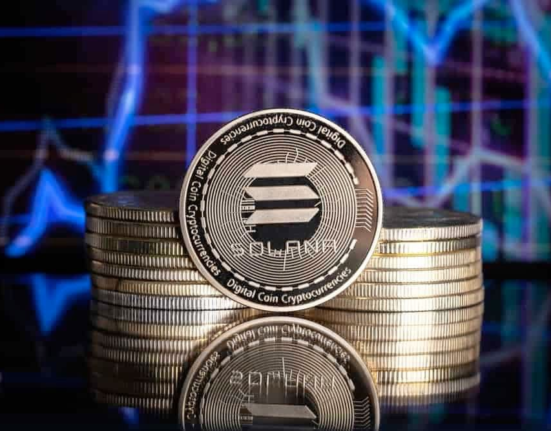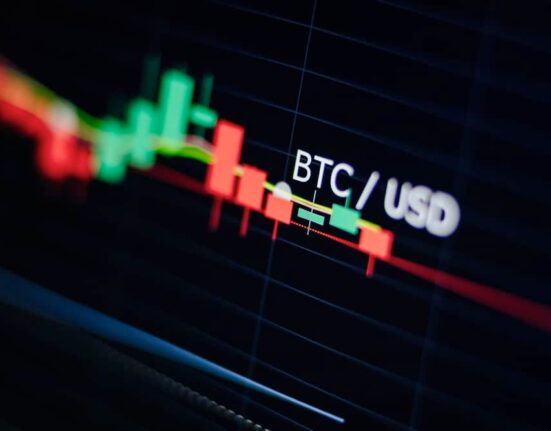Gold and bitcoin are weird.
Bitcoin and gold are zooming, which is not new, because the things people trade in go up and down. These two asset classes don’t interest me, and from time to time, I marvel why people invest in these. Is the current bull run in the two more or less the same? The answer is, mostly, yes. However, I’ll point out something that is different.
Neither is especially useful in the here and now in any practical sense. Bitcoin’s promise as a deregulated digital currency remains just that—a promise. And nobody carries around gold in their hip pocket to purchase goods or services anymore.
While both are “mined,” their only real-world or virtual applications seem to be as tools of pure speculation—or as safe-haven assets. Whenever the world goes half a bubble off plumb, people flock to gold. More and more, they also seem to flock to bitcoin.
The price of an ounce of gold and of a single bitcoin bounced dramatically after governments and central banks around the world, but especially in the United States, pumped money into consumers’s wallets and banks’ coffers as Covid-19 caused an unprecedented global recession.
Many investors are unsure what place, if any, either asset has in their portfolio. Here’s what you need to know to understand how bitcoin and gold might fit into your investment strategy.
Table of Contents
Gold Isn’t Much Of An Inflation Hedge
First, the bottom line: You can add gold to a well-diversified portfolio of stocks and bonds, but experts believe it shouldn’t amount to more than 10% of your holdings.
That said, it’s important to know why you’re adding gold to your holdings. If it’s to fend off inflation, think again. While research shows the value of gold remains constant over a very, very long period—like a millennium or two—it can’t really be counted on as a store of value over a more modest time period. It’s simply much too volatile.
In fact, gold is as volatile as the S&P 500, says Duke professor and senior advisor to Research Affiliates Campbell Harvey, and its returns don’t generally beat returns from the broader stock market over the long term.
Gold’s Advantages as an Inflation Hedge:
- Limited Supply: Unlike currencies, gold has a finite supply, which can make it more valuable as inflation increases the money supply.
- Historical Performance: Over very long periods (think centuries), it has tended to keep pace with inflation.
Gold’s Disadvantages as an Inflation Hedge:
- Short-Term Performance: It prices can be volatile, and in the short term, they may not keep pace with inflation.
- No inherent value: It doesn’t generate income or pay interest, unlike some other inflation hedges like Treasury Inflation-Protected Securities (TIPS).
Here are some additional points to consider:
- Recent Performance: In recent years, gold’s price haven’t always risen alongside inflation.
- Alternatives: There might be better inflation hedges depending on your investment goals. For example, TIPS are designed to protect against inflation.
Overall, gold may be a part of an inflation-hedging strategy, but it’s not a guaranteed safeguard. It’s important to consider your risk tolerance and investment goals when deciding on the best approach.
So Why Should You Invest in Gold?
Gold is better understood as a safe haven that investors embrace when times get soupy. For instance, the S&P GSCI Gold Index gained 7.2% in the last three months of 2018, according to Morningstar data while the stock market declined nearly 14%.
Even during the most recent bear market when equities dropped by 33%, the gold index declined by only 2%. The price of gold then shot up over the next few months to record levels.
But gold volatility can go in both directions. Almost a third of fund managers polled in the August 2020 Bank of America Global Fund Manager Survey stated that they believed that it was overvalued—the highest this sentiment has been since 2011, and up from 0% the month prior.
To put that in context, SPDR Gold Shares, a popular gold exchange-traded fund (ETF), gained 9.6% in 2011 and then 6.6% in 2012, before losing 28.3% in 2013 and then delivering negative returns the following two years.
Gold, then, should be treated as hot sauce rather than the main course in your investment portfolio.
Why Invest in Bitcoin?
Bitcoin is an electronic payment system that exists beyond the control of any central government. While people have been using gold as a medium of exchange for 5,000 year, since ancient Mesopotamia if not earlier, bitcoin is a much more recent affair. It was invented by a person, or people, known as Satoshi Nakamoto, in 2009. As a fledgling endeavor, it has endured wild price swings during its almost decade-long tenure.
The cryptocurrency rose to nearly $20,000 per bitcoin by the end of 2017, only to drop to less than $4,000 by the end of 2018. More recently, the cryptocurrency bounced around right along with stocks and gold. Its value dropped about in half to roughly $5,000 from the middle of February to mid-March, when investors were first coming to grips with the effects of coronavirus. But it jumped to nearly $11,500 five months later.
These dramatic price swings tend to be greater than what you even see with gold, and so the digital currency cannot be viewed as a way to store value, as some like to claim—at least not yet.
That said, “the entire crypto ecosystem has matured substantially,” said Stephen McKeon, associate professor of finance at the University of Oregon. “The question has moved from ‘will this survive’ to ‘how big will this get?’”
Fidelity recently announced plans to create a bitcoin fund, although it’s only set to be available to large institutional and accredited investors. Still, these types of moves may ultimately increase bitcoin’s liquidity and help smooth out the wild price swings.

Here are some of the reasons why people consider investing in Bitcoin:
- High Potential Returns: Bitcoin has a history of significant price increases. While past performance is not a guarantee of future results, some believe Bitcoin’s value could continue to rise significantly.
- Limited Supply: There will only ever be 21 million Bitcoins created. This scarcity is similar to gold and could contribute to its value over time.
- Decentralization: Bitcoin is not controlled by any government or central bank. This appeals to some investors who are wary of traditional financial institutions.
- Transparency: All Bitcoin transactions are recorded on a public ledger called the blockchain. This can provide security and transparency for investors.
- Potential Hedge Against Inflation: Similar to gold, some believe Bitcoin’s limited supply could make it a hedge against inflation, especially since the money supply in traditional currencies can be inflated.
However, there are also significant risks to consider before investing in Bitcoin:
- High Volatility: Bitcoin’s price can fluctuate dramatically, which can lead to substantial losses.
- Relatively New Asset Class: Bitcoin is still a relatively new asset class compared to stocks or bonds. Its long-term viability is uncertain.
- Security Risks: Bitcoin wallets and exchanges can be hacked, leading to theft.
- Regulation: Governments around the world are still figuring out how to regulate Bitcoin. This uncertainty could impact its price and future use.
Key Differences
Gold has dominated the economies and markets for thousands of years as a means of exchange and holding wealth. Bitcoin was launched in 2009 and only achieved widespread recognition several years later. Other key differences can provide clues into which one you might want to include in your portfolio.
| Bitcoin | Gold | |
| Regulations | Depends on the country | Some restrictions |
| Utility | The number of uses is growing | Used across many industries and products |
| Liquidity | Depends on the market and type of asset | Depends on market and type of asset |
| Volatility | Started 2021 at $32,782 rose, to a high of $69,000, closed the year at $46,306, dropped under $20,000 in late 2023, then hit $75,830 in March 2024. | Started 2021 at $1,943 an ounce, dropped to a yearly low of $1,683, ended year at $1,805. |
Regulation
Gold’s established system for trading, weighing, and tracking is pristine. It’s very hard to steal or fake; it’s also highly regulated. In many countries, you cannot cross borders while carrying gold without regulatory permission.5 When investing in gold, you’ll generally only be able to purchase it from registered dealers and brokers; one caveat is that you should only buy physical gold if you can safely store it.
Bitcoin is also difficult to steal and fake, thanks to its encrypted and decentralized system. It is generally legal to use across the borders of different countries, with a few exceptions. However, the regulatory infrastructure that could exist to ensure that users are safe is not yet in place in many countries—the pseudonymous nature of cryptocurrency also makes it challenging to regulate.
Utility
Gold has historically been used in many applications—currency, luxury items, specialized applications in dentistry, electronics, and much more. This cross-functional utility has given gold its ability to maintain value when other asset values fall.
Bitcoin is limited in its utility. It is currently only used as a digital currency and a speculative investment. However, there is an emerging financial technology whose concept is to use cryptocurrency for financial transactions called decentralized finance. Bitcoin has utility in this emerging tech as a form of lending, borrowing, and possibly more. It also has the potential to be involved in nearly as many applications as gold—but following the same line of thought, it has just as much potential to become useless and invaluable.
Liquidity
One primary concern for investors looking toward Bitcoin as a haven is its liquidity. The top few cryptocurrencies by market cap are generally very liquid assets because they have higher trading volumes and more capital invested in them; less popular cryptocurrencies are much less liquid. But there are limits to its liquidity depending on the platform you use.
Volatility
Bitcoin has historically proven to be subject to the media effect, investor sentiment, regulatory actions, and hype. News from the digital currency sphere could prompt investors to panic and make quick decisions, quickly sending Bitcoin’s price upward or downward. This volatility is not inherent to gold for the reasons mentioned above, making it perhaps a safer asset.
Why Do Investors Buy Bitcoin and Gold?
Both gold and bitcoin tend to attract investors when the Federal Reserve, and other central banks around the world, step in to bail out struggling economies. The reasoning works something like this:
Governments reduce the value of their fiat currencies (currencies backed by the full faith and credit of a nation or group of nations) when they print lots of money and drop interest rates close to zero. Investors respond by putting money into currencies not controlled by central governments.
Moreover, when interest rates are so low, and especially when inflation-adjusted interest rates are negative, investors are less enamored with assets that offer yields, like bonds and dividend-paying stocks.
This may induce a bandwagon effect, wherein each new investor keeps the price of a safe-haven asset rising, although they buy at an increasingly high cost. The danger is that some new event or development breaks the momentum and investors bail out. Then you have the dubious honor of buying high and selling low.

Differences Between Gold and Bitcoin
Gold and bitcoin represent different phases of how people think about “money.” It was a currency for thousands of years, and it retains value in part by the psychological and historical attachment investors have to it. Bitcoin, along with blockchain technology, hopes to one day replace government currencies as the means by which people exchange payments.
As an investment, gold is a more mature asset. As such, it tends to be easier to own. For instance, you can buy SPDR Gold Shares, which has an expense ratio of 0.40%, through your brokerage account. There’s really no need to commit yourself to owning physical gold, with its high costs of secure storage.
With Bitcoin, the most common way to invest is to open an account on a cryptocurrency specific exchange, like Coinbase, and actually exchange your dollars for the digital currency. You’ll then need to hold it in a digital cryptocurrency wallet.
More broadly, investing in gold reaffirms your belief in the current international financial system, whereas bitcoin is a bet that a more radical alternative is coming.
“The case for crypto is that it is poised to disrupt a large segment of the financial services industry,” said McKeon. “Decentralized finance applications have now replicated many traditional business lines such as trading, lending, and insurance.”

Should You Invest in Gold or Bitcoin?
You don’t need to invest in either gold or bitcoin to have a well-diversified portfolio. Most investors would do well to ignore their allure and instead own a combination of a U.S. stock index fund, an international index fund, and a bond fund. Most major investment companies offer low-cost options, and you can allocate how much you invest with each based on your age and risk tolerance.
If you want to make a speculative bet on either gold or bitcoin, do it with a small, single-digit, portion of your assets. There isn’t sufficient evidence to suggest either will deliver more consistent returns than a traditional strategy emphasizing stocks and bonds.

Disclaimer ||
The Information provided on this website article does not constitute investment advice ,financial advice,trading advice,or any other sort of advice and you should not treat any of the website’s content as such.
Always do your own research! DYOR NFA
Coin Data Cap does not recommend that any cryptocurrency should be bought, sold or held by you, Do Conduct your own due diligence and consult your financial adviser before making any investment decisions!





Leave feedback about this